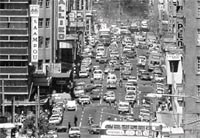SOUTH AFRICA
 Government plans to introduce a fleet of new taxis running on diesel has triggered off an outcry in South Africa. Environmentalists view the country's new-generation taxi fleet with diesel fuel as a major "lost opportunity' to reduce air pollution.
Government plans to introduce a fleet of new taxis running on diesel has triggered off an outcry in South Africa. Environmentalists view the country's new-generation taxi fleet with diesel fuel as a major "lost opportunity' to reduce air pollution.
While supporting the initiative to improve the public transport system, the Wildlife and Environment Society has, however, said that it was alarmed that the government continued to give preference to a dirty fuel like diesel as against cleaner fuels or alternative technology, said the society's spokesperson, Liz McDaid. "Internationally, there are numerous examples of governments taking steps to reduce or phase out diesel vehicles because of their health-threatening emissions,' she said.
She pointed out that the society had been lobbying the government since December to make use of the opportunities presented by the taxi recapitalisation plan. The project intends to replace the traditional 16-seater petrol-driven minibus taxis with 18-seater and 36-seater, standardised "midibuses'.
McDaid said that if the government was serious about trying to reduce air pollution, it should have conducted a full-scale environmental impact assessment ( eia ) into the health and environmental impact of new diesel taxis. The government should also have assessed a variety of alternatives, including solar power, gas power, hybrid fuels or electrically powered train commuter systems.
"We believe that the results of such an eia may well show that diesel is not the best fuel option,' McDaid said, adding: "We also need to ask the question: Is the government serious about reducing health problems and air pollution?'
Related Content
- South African Renewable Energy Masterplan (SAREM)
- Learning Interrupted: Global Snapshot of Climate-Related School Disruptions in 2024
- Africa Solar Outlook 2025
- Blue and Green Drop Project Report 2024
- Global LNG outlook 2024-2028
- Empowering women for effective climate change adaptation: the role of the private sector
